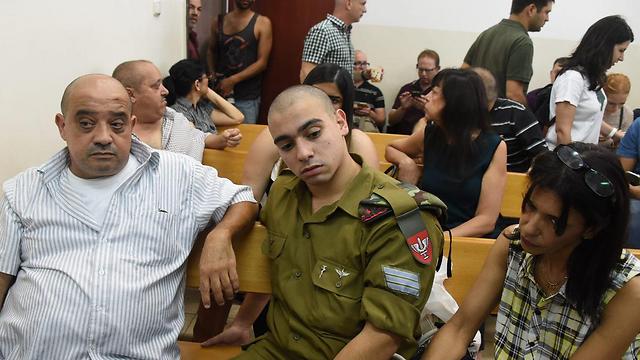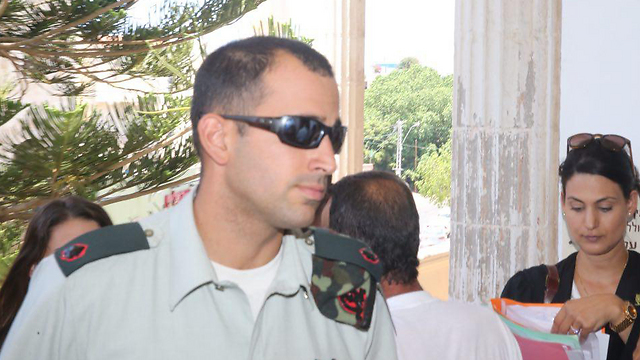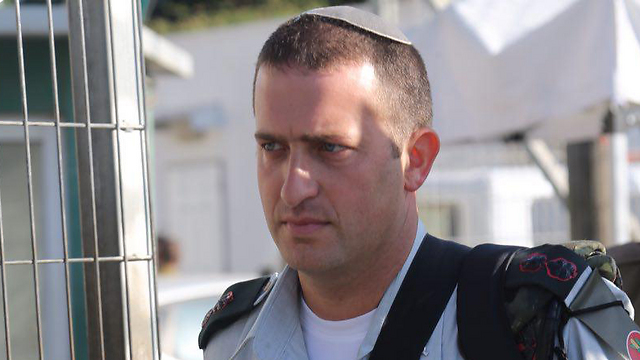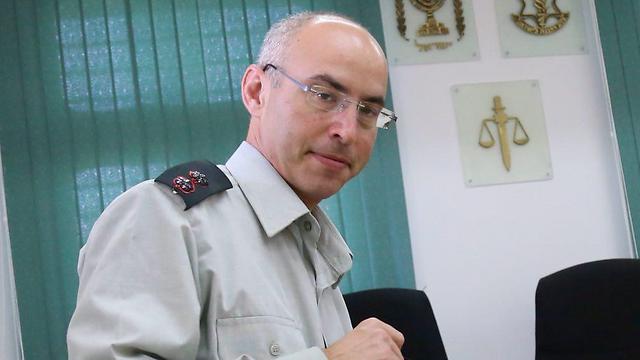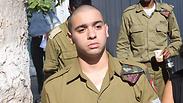
Azaria: 'If you suspect you don't hesitate, you fire'
A day after Sgt. Elor Azaria provided his first version of events surrounding the shooting of a neutralized terrorist, defendant maintains main line of defense: 'Try explaining to a mother whose son was killed because he didn’t shoot because he only suspected.'
Azaria opened by stating that paramedic A., who testified against him along with other witnesses, had forgotten to include certain things which were key to the case.
After being pressed by prosecutor Lt. Col. Nadav Weisman and asked whether all the witnesses were lying, Azaria said that not all but that Company Commander Maj. Tom Na'aman “was a lying witness. Many of the things said by the battalion commander (Lt. Col. David Shapira),” he continued, “do not illustrate everything. He forgot to say a few things. I cannot say that the battalion commander is a liar but on a few points he lied.”
“I don’t want to be like a parrot but I have no choice. I don’t fully remember the testimony of the brigade commander. Show me it and I will respond to your question about whether he lied or not,” Azaria told Weisman before reiterating that “the company commander slapped me in the face and I am still undergoing psychological help.”
When asked to explain why he waited until last week to claim that the company commander had slapped him twice following the shooting, Azaria said, “During the investigation at the IDF's Criminal Investigation Division (CID), I didn’t remember a few things. I was still in shock from the incident. There was always something that made me want to finish the investigation as quickly as possible.”
The prosecution produced a video for the first time from the investigation room when Azaria was originally brought in for questioning in which he can be heard saying, “the company commander was not angry at me” - a statement which appeared to contradict his new testimony regarding the slap.
Azaria retorted, however, by saying, “My mental state was not good. I am not a psychologist” prompting the prosecutor to state: “Listen to me. You know very well (what I mean).”
Azaria then told the examiner, “It isn’t right that a soldier hits another soldier in the company.” When he accused him of avoiding the question, Azaria said, “I will continue to answer like a parrot. Things have emerged which strengthen my case.”
He went on to state that he was able to recollect his thoughts as he prepared his case with his lawyers. When Weisman demanded that Azaria provide names of witnesses who saw him being slapped in the face, he said that two or three people were standing nearby and saw the incident. I was in shock from the company commander’s response and from the whole incident. Anyone in the field can understand what I am talking about.”
The prosecution then called into question his claims about the slap stating that his cellphone correspondence on the day of the incident contained no mention whatsoever of such an occurrence and that he never informed anyone that he had been slapped. He concluded by saying, "you invented the slap claims."
"I was in shock that is why I never told the battalion commander about the slap,' Azaria said.
Azaria was asked about his behaviour next to his company commander which was captured on camera by B’Tselem, in light of his claims that he had just been slapped: “The clips mean nothing to me. They never did and they never will.”
The point was pressed by the prosecutor who told the defendant that the court could order him to address the clips since they are pieces of evidence in the case. After repeating his contempt for the clips, Azaria turned his focus onto B’Tselem: “The B’Tselem photographer claimed that they photograph infringements of human rights. I have never seen them document terror attacks.”
The prosecutor then showed Azaria a picture from the scene in which he can be seen smiling: “Is this how a soldier looks after he has been slapped by his company commander a few minutes before and who claims he is in shock?” asked Weisman. “Possibly,” Azaria said. He added that he never told his commanders about the slap because he didn't think to."
He also repeated the claims that “our commanders never trained us about what to do in the case of a bomb. We never asked about bombs because they only spoke to us about knives.”
He later sought to draw attention to the fact that the prosecutor had no experience of the situation in the field: “You have never been in this kind of situation so obviously you will not understand what it is to be in the field during an incident such as this where any moment you or your friend or a civilian can die. It is nice in here where there is air conditioning.”
“I am not offended by your personal comments,” the prosecutor responded, “even though they are not appropriate.”
“I see now that with there being an air conditioner here there is time to think when you are not exposed to danger but in the field it is a matter of fractions of seconds," Azaria said.
The president of Jaffa Military Court, Colonel Maya Heller then interjected, telling him: “It is time to finish this part and for you to answer the question which had been put to you four times: Were you surprised by the questions about your reactions in the field?”
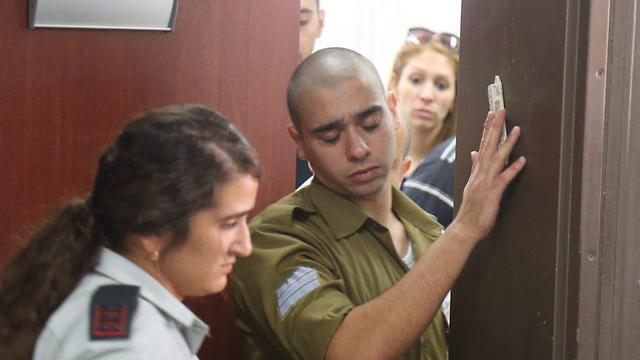
“Of course we need to move away from this but it is totally different in the field when you don’t have a moment to think and you recognize the danger," he repeated.
When the hearing reconvened in the afternoon, discussions revolved around the rules of engagement and opening fire.
“If the terrorist is neutralized and doesn’t constitute danger there is no need to shoot him,” said Azaria. “Even forbidden to shoot him,” added the prosecutor. Azaria responded by emphasizing: “It is forbidden to shoot him if he doesn’t constitute a danger.”
“Based on the circumstances, if you have any reasonable suspicion that the terrorists has the means to carry out an attack, you don’t see it, but you know that you suspect it, then that is enough to neutralize him. Why? Because we are taught that if there is a suspicion then you don't wait,” he said.
The judge then took Azaria to task about this well-known military proverb. “Doesn’t this phrase not mean the opposite? That is to say, when there is a doubt you are not supposed to open fire in order to avoid mistakes.”
“I understand from this sentence,” Azaria replied, “that when there is a doubt, a fear that a terrorist (could strike) you neutralize him.”
Asked whether—with the knowledge of hindsight that the terrorist did not have a bomb on his body—he would have shot him, Azaria said, “I think that I acted as I was supposed to."
"With the suspicion that I had you don’t take the risk. He could blow himself up and you would feel guilty that you did nothing about it. How can you explain to the mother whose son was killed because he didn’t shoot because he only suspected.”
“If you had known at the time that he did not have an explosive under his clothes would you have shot him?”, he was asked to which he replied: “That is the whole point, ‘if.’ I don’t know. I had two concerns in mind, an explosive and a knife. If I had known that a check had been conducted I would not have shot him in the head.”
The prosecution put before Azaria the question, “Could it be that to this day you think that the terrorist needed to be shot because he deserved to die for trying to stab your friends?”
The point was dismissed by Azaria: “I didn’t shoot him because he stabbed my friend. I shot him because I sensed an immediate danger to people at the scene.”
“Can you confirm for me that the terrorist’s hand was not close to the knife?,” the Weisman continued.
“Only based on what is seen in the video. I saw it in real time. When I was there his hand was close to the knife.”










